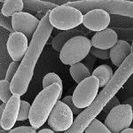| CANDIDA Candida is a condition occurring when there is, initially, an excess growth of the yeast Candida albicans (or other species) in the digestive system, which then spreads to other systems and organs. Candida tends to cause a variety of symptoms that can appear to be unrelated. Also, Candida can puzzle health practitioners. A Nutritionist tries to link the symptoms causing suffering, and thereby understand the underlying cause. Hence, we often diagnose Candida after sufferers have been diagnosed with conditions like IBS, ME (chronic fatigue), skin problems, chronic headache, feeling unwell, lethargy etc: these are often present, but are usually secondary to the Candida infection. Symptoms Because the overgrowth of yeast compromises the integrity of the intestinal lining, it often causes symptoms like: - Headaches - Foggy brain - Muscle and joint pains - IBS/constipation/diarrhoea - Bloating - Allergies/food intolerances - Itchy anus - Flatulence By overworking the immune system, the person will often feel run down and suffer with: - Coughs and colds - Sinusitis - Ear infections - Opportunistic infections like fungal infections of the skin or nails. Because it spreads to other systems, it will often cause: - Thrush - Cystitis - PMS/hormonal imbalances - Weight gain (particularly around the waist) - Asthma - Hay fever The combination of all these factors explains the most common symptoms: - Fatigue - Exhaustion - Lethargy - Anxiety - Depression What causes Candida? Candida albicans is present in healthy individuals and carries out useful functions. However, it is kept to a limited quantity by other organisms (e.g. healthy bacteria) as well as our immune system. If the balance in the digestive is disturbed, the yeast being able to grow very rapidly, then takes over. Antibiotics are the main culprits in upsetting this healthy balance. The use of Steroids will affect the yeast growth and our immune system, as well as the contraceptive pill. Also, any major trauma or ongoing stress can affect our general health and immune system can lead to Candida. It generally affects women more than men. It is rarely recognized by the medical profession as a condition, except in severe cases. Treatment Candida sufferers, because of the lack of diagnosis by the medical profession, will often self-diagnose eventually. However, when it comes to treating the condition, self-help and treatment is highly discouraged. It needs to be a multi-factorial approach with a combination of dietary changes, supplementation and treatment. Restricting the treatment to one of those only will often fail. This leads to further despair and will often aggravate the Candida condition. My approach is: Carrying out a food allergy and intolerance test so that those foods can be avoided as part of the treatment. Treating the Candida, boosting the immune system, improving the digestion, helping the body eliminate toxins and treating any other system affected. Supplementing with healthy bacteria which will help restore a healthy environment in the digestive tract. Addressing factors like stress, emotional upset, environmental factors etc that may be at the root of the problem. Prescribing an anti-candida diet but tailored to the individual’s needs, with a realistic plan, discussing alternative foods so that the diet can successfully be achieved. With this approach, sufferers respond very well and often some symptoms improve within days of starting the treatment, some within weeks. The treatment often transforms the life of the person. Contact Eat To Live for more information or to book an appointment. #fodmap#nutritionist#dietician#ibs#fasting#low#reintroduction#how#to#help#weightloss#faversham#kent#canterubry#kent#dover#herbalist#apotheca#allergy#intolerance#testing# |
|
3 Comments
Paul Cooper
10/14/2021 05:07:52 pm
I am sure that I have a form of “Candida” in my blood stream. My doctor says it is not possible, that I would be dead, if I had it. I have so many symptoms, from runny nose, fungal rashes, leaky gut and bleeding from my tongue. I am given creams which work well on the rashes, but as soon as I stop using them, the rashes return. I need to know how I can get a blood test, to see if candida is in my blood stream, but my Dr will not sanction it. What do you advise?
Reply
Kroel
5/24/2023 10:29:59 am
I need to check my son
Reply
Archit Mehta
9/24/2023 06:59:03 pm
Your post goes beyond the surface-level information and delves into the nuances of the topic. It's a valuable resource. To delve deeper, <a href="https://0ca775s9mr6pbv4z-bp7o5t71d.hop.clickbank.net" target="_blank">click here</a>.
Reply
Leave a Reply. |
TOPICS
All
AuthorVictoria Shorland, Nutritionist and Allergy Consultant. |


 RSS Feed
RSS Feed